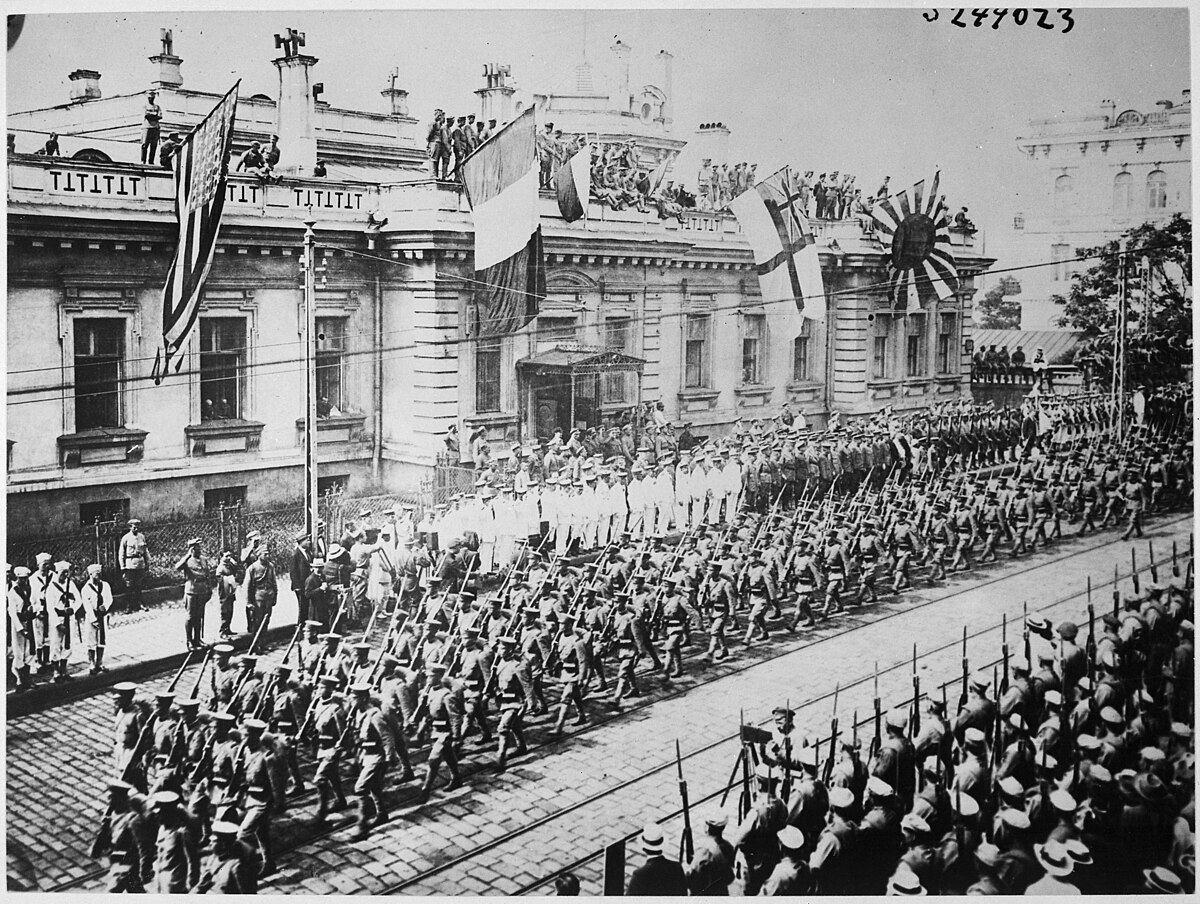I had this idea since high school. Back when I was going through a Russian Empire phase.
You are using an out of date browser. It may not display this or other websites correctly.
You should upgrade or use an alternative browser.
You should upgrade or use an alternative browser.
AHC: The Russian Revolution of February 1917 is crushed by alied soldiers who were told that the revolutionaries were aiding Germany.
- Thread starter PrussianQing2015
- Start date
Which Allied Soldiers exactly?
Either English or French. Hard to choose.
Either English or French. Hard to choose.
That is sort of the crux of the question, isn't it? It isn't as if there are armies of Allied troops at hand to use. Russia is hard to get to in this time frame, and difficult to extend control over. The Allies did, of course, send some troops to help the Whites in OTL.

Allied intervention in the Russian Civil War - Wikipedia
The February Revolution was actually in March, the Russians just named it according to the date on the Julian Calendar which they still used at the time. The revolutionaries weren't a monolithic bloc, but the resulting Provisional Government maintained its commitment to the Allied cause and it was somewhat quickly recognized first by the USA and a couple days later by Britain, France, and Italy. Ordering Allied soldiers away from the Western Front to attack an erstwhile ally would be doing more to aid the Germans than the February Revolution itself did.
The Entente had neither the means nor the desire to crush the February Revolution. They thought it was anything but pro-German or pro-peace-at-any-price--and (at first) they were absolutely right. Sukhanov, a left-wing "Zimmerwaldist" Menshevik wrote with regret that "During the first weeks the soldiers of Petrograd not only would not listen, but would not permit any talk of peace. They were ready to lift up on their bayonets any uncautious 'traitor' or exponent of 'opening the front to the enemy.'" (Quoted in Adam Ulam, The Bolsheviks, p. 325. https://books.google.com/books?id=TdCK1WkconkC&pg=PA325; see https://books.google.com/books?id=6-D_AwAAQBAJ&pg=PA202 for a slightly different translation.) Indeed, there was hope that a popular government in Russia could prosecute the war more effectively than the Tsar had done (a good many people in the West believed in the myth that Alexandra was pro-German).
I doubt Americans would be happy. The Russian Czar was the boogeyman of pre-World War 1 America
Indeed, Wilson specifically pointed to the February Revolution in asking Congress for a declaration of war:
" Does not every American feel that assurance has been added to our hope for the future peace of the world by the wonderful and heartening things that have been happening within the last few weeks in Russia? Russia was known by those who knew it best to have been always in fact democratic at heart, in all the vital habits of her thought, in all the intimate relationships of her people that spoke their natural instinct, their habitual attitude towards life. The autocracy that crowned the summit of her political structure, long as it had stood and terrible as was the reality of its power, was not in fact Russian in origin, character, or purpose; and now it has been shaken off and the great, generous Russian people have been added in all their naive majesty and might to the forces that are fighting for freedom in the world, for justice, and for peace. Here is a fit partner for a league of honour." https://wwi.lib.byu.edu/index.php/Wilson's_War_Message_to_Congress
No doubt because of the decision for unlimited submarine warfare and the Zimmerman Telegram, the US would have gone to war with Germany anyway, but the February Revolution did make it much easier to sell the war as a clear-cut struggle between democracy and despotism.
("I need scarcely remind you that practically every element in this moving statement — the belief in the democratic traditions and instincts of the Russian people, the belief that the Tsar's government had been an alien regime, the belief that the common people of Russia saw the war (rather than internal revolution) as the means whereby freedom, justice, and peace were to be attained — reflected a complete misunderstanding of the real situation in Russia. The statement did honor to Wilson's generous ideals, not to his knowledge of the outside world." George F. Kennan, Russia and the West Under Lenin and Stalin, p. 24)
Last edited:
In the Far East American and Japanese take control of about 200 miles inland from VladivostokThat is sort of the crux of the question, isn't it? It isn't as if there are armies of Allied troops at hand to use. Russia is hard to get to in this time frame, and difficult to extend control over. The Allies did, of course, send some troops to help the Whites in OTL.

Allied intervention in the Russian Civil War - Wikipedia
en.wikipedia.org
Share: